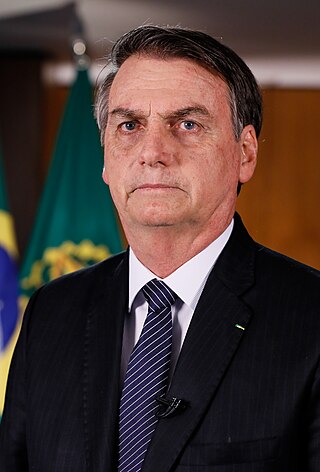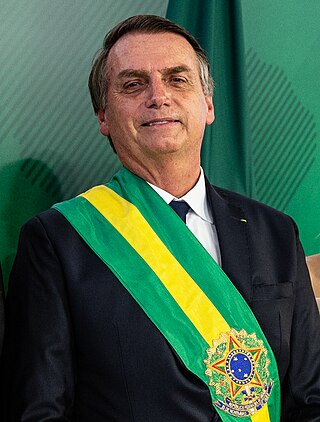
The Ministry of Foreign Affairs is responsible for managing the foreign relations of Brazil. Brazil is a significant political and economic power in Latin America and a key player on the world stage. Brazil's foreign policy reflects its role as a regional power and a potential world power and is designed to help protect the country's national interests, national security, ideological goals, and economic prosperity.

Luiz Inácio Lula da Silva, also known as Lula da Silva or simply Lula, is a Brazilian politician who is the 39th and current president of Brazil. A member of the Workers' Party, he previously served as the 35th president of Brazil from 2003 to 2010.

The United States embargo against Cuba prevents US businesses, and businesses organized under US law or majority-owned by US citizens, from conducting trade with Cuban interests. It is the most enduring trade embargo in modern history. The US first imposed an embargo on the sale of arms to Cuba on March 14, 1958, during the Fulgencio Batista regime. Again on October 19, 1960, almost two years after the Cuban Revolution had led to the deposition of the Batista regime, the U.S. placed an embargo on exports to Cuba except for food and medicine after Cuba nationalized the US-owned Cuban oil refineries without compensation. On February 7, 1962, the embargo was extended to include almost all exports. The United Nations General Assembly has passed a resolution every year since 1992 demanding the end of the US economic embargo on Cuba, with the US and Israel being the only nations to consistently vote against the resolutions.

Geraldo José Rodrigues Alckmin Filho is a Brazilian physician and politician who has served as the 26th vice president of Brazil since 1 January 2023. He previously served as the Governor of São Paulo from 2001 to 2006, and then again from 2011 to 2018, the longest term served in that state since the end of the Military dictatorship in Brazil. He was the Brazilian Social Democracy Party (PSDB) presidential nominee for the 2018 Brazilian presidential election, when he finished in fourth place, as well for the 2006 Brazilian presidential election, when he came in second place, losing in the runoff to then president Luiz Inácio Lula da Silva.

Brazilian history from 1985 to the present, also known as the Sixth Brazilian Republic or New Republic, is the contemporary epoch in the history of Brazil, beginning when civilian government was restored after a 21-year-long military dictatorship established after the 1964 coup d'état. The negotiated transition to democracy reached its climax with the indirect election of Tancredo Neves by Congress. Neves belonged to the Brazilian Democratic Movement Party (MDB), the former controlled opposition to the military regime. He was the first civilian president to be elected since 1964.

Cuba and the United States restored diplomatic relations on July 20, 2015, after relations had been severed in 1961 during the Cold War. U.S. diplomatic representation in Cuba is handled by the United States Embassy in Havana, and there is a similar Cuban Embassy in Washington, D.C. The United States, however, continues to maintain its commercial, economic, and financial embargo, making it illegal for U.S. corporations to do business with Cuba.

Brazil–Russia relations have seen significant improvement in recent years, characterized by increased commercial trades and cooperation in military and technology segments. The two countries maintain important partnerships in areas such as space, military technologies, and telecommunications.

Brazil–Israel relations are the bilateral relations between the Federative Republic of Brazil and the State of Israel. Brazil has an embassy in Tel Aviv and an honorary consulate in Haifa. Israel has an embassy in Brasília and a consulate-general in São Paulo. The Brazilian ambassador to Israel is Gerson Menandro Garcia de Freitas. Israel's current ambassador to Brazil is Daniel Zohar Zonshine. Brazil and Israel maintain close political and military ties. The two nations enjoy a degree of arms cooperation. Brazil is a full member state of the International Holocaust Remembrance Alliance, while several Brazilian elected officials participate in the Israel Allies Caucus, a political advocacy organization that mobilizes pro-Israel parliamentarians in governments worldwide.

Brazil–Palestine relations are the current and historical bilateral relations between Brazil and Palestine. On 5 December 2010, Brazil officially recognized the State of Palestine including all of the West Bank and the Gaza Strip, and having Jerusalem as its capital. In 2015, the Embassy of the State of Palestine to Brazil was opened in Brazil's capital, Brasília, and the Brazilian government received an area in Ramallah for installing its diplomatic mission to Palestine.

Jair Messias Bolsonaro is a Brazilian politician and retired military officer who served as the 38th president of Brazil from 2019 to 2022. He previously served in the Brazil Chamber of Deputies from 1991 to 2018.

General elections were held in Brazil on 7 October 2018 to elect the president, National Congress and state governors. As no candidate in the presidential election received more than 50% of the vote in the first round, a runoff round was held on 28 October.

Bolivia–Cuba relations refers to the diplomatic relations between Bolivia and Cuba. Both nations are members of the United Nations, but relations of Bolivia with Cuba, like those of most countries in the Western Hemisphere with the notable exceptions of Canada and Mexico, have waxed and waned over the decades depending on geopolitical and regional political circumstances. Relations were good under Evo Morales, who shared the position of his like-minded left-wing allies in Nicaragua and Venezuela that Fidel Castro was a humanist and beloved icon of resistance to US hegemony in the Americas.

Flávio Nantes Bolsonaro is a Brazilian politician, lawyer and entrepreneur who is the eldest child of the 38th President of Brazil, Jair Bolsonaro.

The presidency of Jair Bolsonaro started on January 1, 2019, when he was inaugurated as the 38th president of Brazil, and ended on December 31, 2022, with the inauguration of the cabinet of Lula da Silva III on January 1, 2023. He was elected the president of Brazil on October 28, 2018, by obtaining 55.1% of the valid votes in the 2018 Brazilian general election, defeating Fernando Haddad. On October 30, 2022, Bolsonaro was defeated by Lula da Silva. In the years Brazil has been a democracy since 1985, Bolsonaro became the first president to lose an election as an incumbent.

Luiz Henrique Mandetta is a Brazilian pediatric orthopedist and politician, member of the Brazil Union (UNIÃO). Mandetta was announced on 20 November 2018 as Minister of Health of president Jair Bolsonaro, replacing Gilberto Occhi. On 16 April 2020 he was fired by Bolsonaro after disagreements over social distancing policies during the coronavirus pandemic.

General elections were held in Brazil on 2 October 2022 to elect the president, vice president, the National Congress, the governors, vice governors, and legislative assemblies of all federative units, and the district council of Fernando de Noronha. As no candidate for president—or for governor in some states—received more than half of the valid votes in the first round, a runoff election for these offices was held on 30 October. Luiz Inácio Lula da Silva received the majority of the votes in the second round and became president-elect of Brazil.

The 2019 BRICS summit was the eleventh annual BRICS summit, an international relations conference to be attended by the heads of state or heads of government of the five member states Brazil, Russia, India, China and South Africa. The meeting was held at the Itamaraty Palace, where the Brazilian Ministry of Foreign Affairs is located. The Brazilian capital hosted the BRICS summit for the second time. The Sherpa meeting was held in the Brazilian city of Curitiba between March 14 and 15.

Brazil–Venezuela relations are the diplomatic relations between the bordering countries of Brazil and Venezuela.

General elections were held in Paraguay on 30 April 2023 to elect the president, vice president, National Congress, and departmental governors. The incumbent president Mario Abdo Benítez and vice president Hugo Velázquez Moreno, both of the Colorado Party, were ineligible for re-election.
General elections will be held in Brazil on 4 October 2026 to elect the president, vice president, members of the National Congress, the governors, vice governors, and legislative assemblies of all federative units, and the district council of Fernando de Noronha. If no candidate for president—or for governor in some states—received more than half of the valid votes in the first round, a runoff election for these offices will be held on 31 October.





















